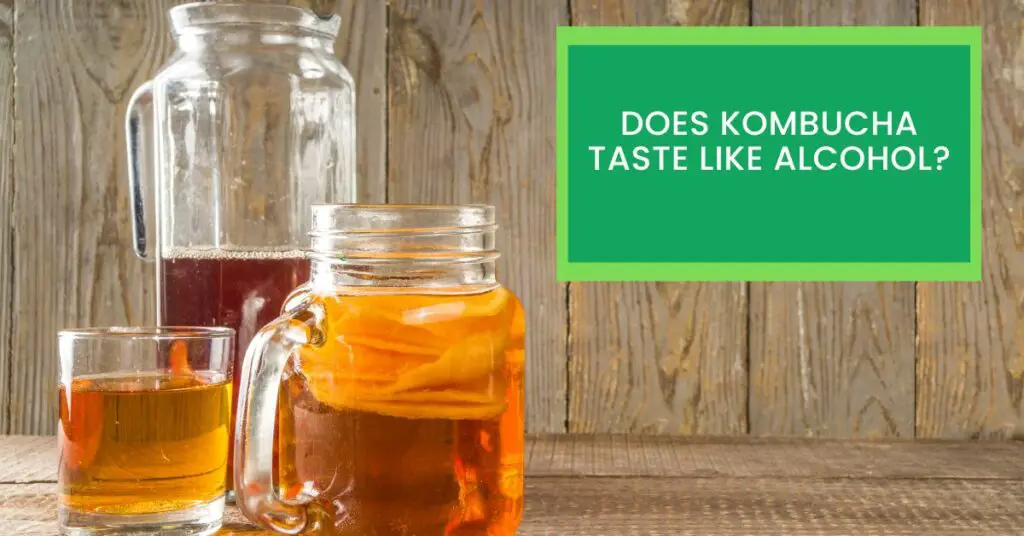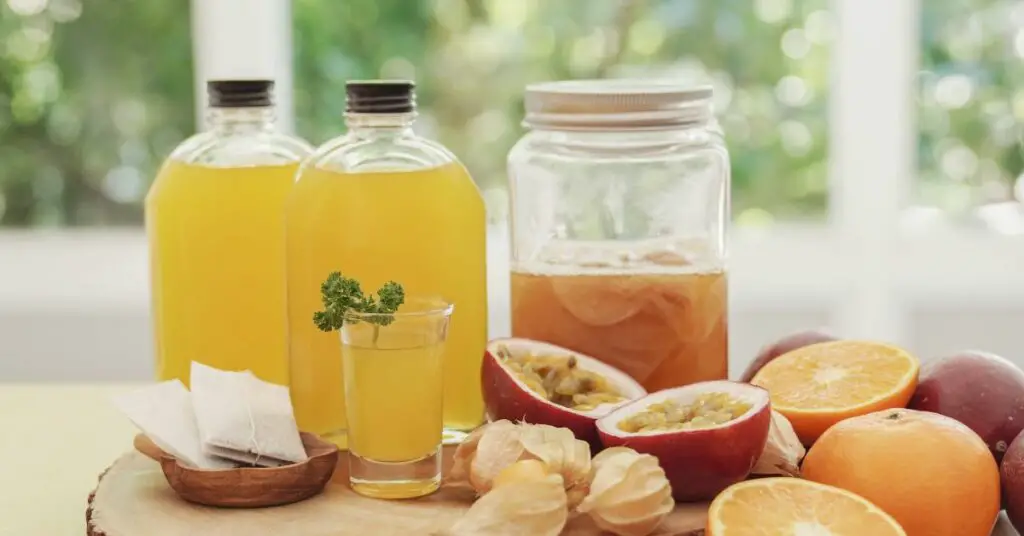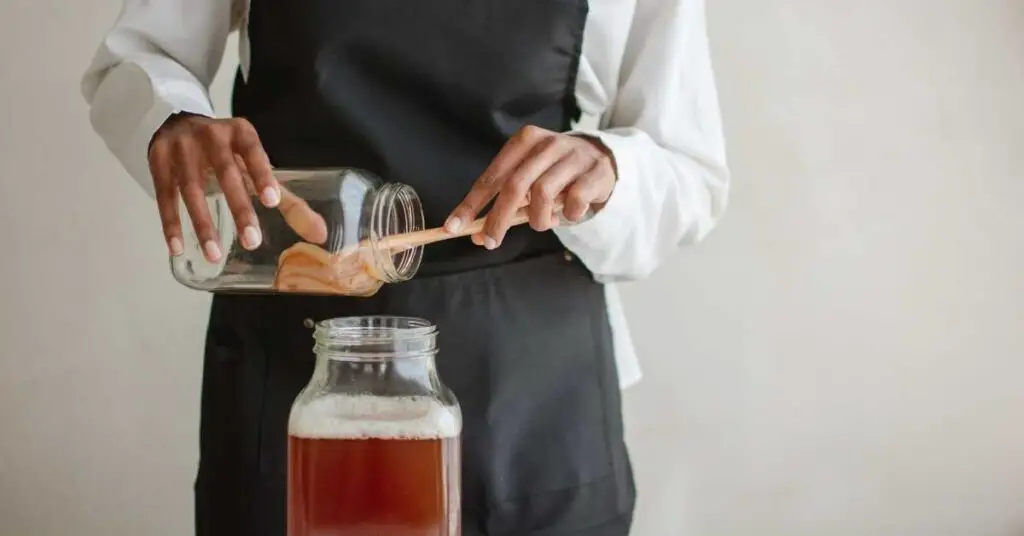Kombucha is a delicious and healthy drink that has many benefits. It is made from fermented tea and is rich in probiotics, which are good for gut health.
However, since there is a small alcohol percentage in kombucha, most people whether this fermented drink tastes like alcohol.
The truth is that kombucha has a sweet, bitter, alcoholic, and fizzy taste, and it’s not purely alcoholic taste.
In this article, we will discuss more the taste of kombucha, its alcohol content, and how it is made.
What is Kombucha? How To Make Kombucha?
Kombucha is a fermented tea that has been around for centuries. It is made by combining tea, sugar, and a SCOBY (symbiotic colony of bacteria and yeast). The SCOBY ferments sugar and tea, creating a probiotic-rich beverage that is full of health benefits.
Kombucha has been shown to improve gut health, boost immunity, and even help with weight loss. It is a great alternative to sugary drinks like soda and can be enjoyed by people of all ages. If you are looking for a healthy beverage that is also delicious, give kombucha a try!
Describe The Taste Of Kombucha?
Nowadays, kombucha comes to the market in different fruity and botanical flavours, but what does traditional kombucha taste like?
This traditional kombucha tea beverage has a slightly sour, effervescent, and acidic taste with a hint of sweetness. The longer the kombucha is left to ferment, the sourer it will become.
Some people describe the taste of kombucha as being similar to cider or vinegar. However, many find that the taste of kombucha is refreshing and pleasantly uplifting.
If you’re curious about kombucha, many different brands and flavourings are available to try. Or, you can even make your own kombucha at home!
Why Does Some Kombucha Taste Like Alcohol? Kombucha Flavors
Kombucha is a popular fermented beverage made from sweetened black or green tea.
During the fermentation process, bacteria and yeast work together to break down the sugar in the tea, which produces alcohol. However, the final product contains only trace amounts of alcohol – typically less than 0.5%.
While kombucha made with green tea may have a slightly earthy taste, kombucha made with black tea tends to be more robust and full-flavored. Some kombuchas can also taste sour or vinegary due to the fermentation process.
So why does some kombucha taste like alcohol?
There are a few reasons why your kombucha may taste like alcohol. First, if the kombucha is not properly fermented, it may contain higher levels of alcohol.
Second, some brands of kombucha add fruit juices or flavors that can mask the taste of alcohol. Finally, if you are sensitive to alcohol, you may be able to taste it more easily in kombucha than other people.
If you’re concerned about the alcohol content in kombucha, you can always check the label to see how much alcohol is present. Or, you can make your own kombucha at home and control the fermentation process to ensure that only trace amounts of alcohol are produced.
The Taste of Kombucha Vs. Liquor
Kombucha is a type of fermented tea that has become increasingly popular in recent years. Some people swear by its health benefits, while others simply enjoy its slightly sour and fizzy taste. Liquor, on the other hand, is an alcoholic beverage that is often used for its intoxicating effects.
So, what does kombucha taste like in comparison to liquor? Well, it really depends on your personal preferences.
Some people say that kombucha tastes similar to a sour beer or cider, while others find it to be sweeter and more refreshing. As for liquor, its taste can vary depending on the type of alcohol and how it is made. But generally speaking, liquor is much more potent and has a harsher taste than kombucha.
How to Make a Kombucha For The Traditional Taste?
Though kombucha has become popular in recent years, many people still don’t know how to make it themselves. This tutorial will show you how to brew your own kombucha at home, using simple ingredients and equipment.
To make a traditional bottle of kombucha, you will need:
-1 cup of sugar
-1 gallon of filtered water
-1 SCOBY (symbiotic colony of bacteria and yeast)
-1 cup of brewed kombucha (from a previous batch or store-bought)
Brewing kombucha is a simple process, but it does take a bit of time. The first step is to make a sweet tea base, which will be the foundation of your kombucha.
To do this, bring the water to a boil and dissolve the sugar in it. Then, let the tea cool to room temperature before adding your SCOBY and kombucha starter.
Once the tea is cool, transfer it to a glass jar or container and add the SCOBY and kombucha starter. Cover the jar with a cloth and rubber band, and let it sit at room temperature for 7-30 days.
After this fermentation period, your kombucha will be ready to enjoy! Be sure to refrigerate it, as kombucha will continue to ferment and become more acidic over time. Enjoy the traditional taste of kombucha!
What Type Of Tea Used To Make Kombucha?
Kombucha is a fizzy fermented tea that has become quite popular among those looking for a tasty and healthy beverage.
It’s made by combining sweetened tea with a symbiotic culture of bacteria and yeast, known as a SCOBY.
While there are many types of tea that can be used to make kombucha, one of the most common is white tea.
This type of tea is made from the youngest leaves on the tea plant and is known for its delicate and subtle flavor. It’s also high in antioxidants, which can help to promote health and wellness.
When preparing white tea for use in kombucha, it’s important to choose a high-quality brand that is free of any additives or artificial flavors.
The tea should be brewed using filtered water that is free of any contaminants, as these can harm the SCOBY and affect the final flavor of the brew.
Once the tea has been brewed and sweetened, it is added to a jar along with the SCOBY and allowed to ferment for several days.
The result is a tangy and slightly sweet beverage that is packed with probiotics and other beneficial nutrients.
Does Kombucha A Probiotic?
Kombucha is a carbonated drink that has been gaining popularity in recent years.
While some people enjoy it for its tangy flavor and fizziness, others praise it for its potential health benefits.
One of the claims made about kombucha is that it is a probiotic, meaning it contains live bacteria that can improve gut health.
Probiotics have been linked to a range of health benefits, including better digestion, improved immune system function, and even mental health benefits.
However, it’s important to note that not all kombucha is created equal, and some varieties may not contain enough live and active bacteria to have a significant impact on health.
Kombucha is made by fermenting tea with sugar and a special blend of bacteria and yeast.
This process creates a fizzy, slightly sour drink that may contain beneficial bacteria strains like Lactobacillus and Bifidobacterium.
While there is limited scientific research on the specific benefits of kombucha, it’s possible that regular consumption of this drink could have a positive impact on gut health.
As with any dietary supplement, it’s always a good idea to talk to your doctor before adding kombucha to your diet to ensure it’s safe for you.
Tips For Enjoy The Real Taste of Kombucha
Some people find the taste of kombucha to be an acquired one, but once you get used to it, it can be a delicious and refreshing beverage. Here are some tips for enjoying the real taste of kombucha:
1. Let it ferment. The longer kombucha ferments, the more sour and acidic it will become. If you are new to kombucha, start with a shorter fermentation time and gradually increase it until you find the taste that you like.
2. Mix it up. Kombucha can be flavoured with fruit juices, herbs, and spices. This is a great way to make it more palatable if you are not a fan of the taste of traditional kombucha.
3. Drink it cold. Kombucha is best served chilled, so make sure to refrigerate it before drinking.
4. Go easy on the sugar. Kombucha is a naturally sweetened beverage, so there is no need to add any additional sugar. However, if you find the taste too tart, you can add a bit of honey or agave nectar to sweeten it up.
5. Enjoy it in moderation. As with any fermented food or beverage, kombucha should be consumed in moderation. It is high in sugar and can cause stomach upset if consumed in large amounts.
By following these tips, you will be able to enjoy the real taste of kombucha and reap all of its health benefits.
Frequently Asked Questions Related to The Taste of Kombucha
1. Does kombucha taste like beer?
Kombucha does not taste like beer, but it does have a slightly sour and acidic taste that some people find similar to beer. Kombucha also has a slightly sweet, bitter, alcoholic, and fizzy taste, which is due to the presence of the SCOBY (symbiotic colony of bacteria and yeast) and the tea ferments.
2. What should kombucha taste like?
Kombucha should have a sour, slightly sweet, and slightly effervescent taste. Some people liken the taste to sparkling apple cider, while others say it tastes like tart lemonade.
Kombucha can also vary in sweetness, depending on the type of tea used and the length of fermentation.
3. Is kombucha just alcohol?
Kombucha is not just alcohol. Kombucha is a fermented drink that contains bacteria and yeast. Together, these microorganisms eat the sugar in the tea and produce ethanol and carbon dioxide.
Some of the carbon dioxides escape as bubbles, while some of them dissolve into the liquid, making kombucha slightly effervescent. So, yes, kombucha does contain alcohol, but it’s not just made up of alcohol.
Happy Sipping!
Read More
1.How Long Does Homemade Kombucha Last? Read This to Learn About The Expiry Date of Homemade Kombucha.
4.Does Kombucha Make You Poop? Read This to Find Out Whether Kombucha Help You Poop





